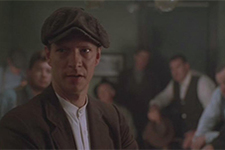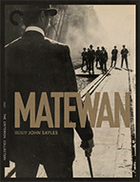Matewan
|  Early in Matewan, writer/director John Sayles’s moving, dramatic tribute to the working men of the early 20th century, the owner of a West Virginia coal mining company briefs his new workers about their jobs. These workers are poor black Alabamans who have been shipped up by railroad to take the place of striking miners. The company owner quickly tells them about where they will be working, how long they will be working for, and what they will be paid. Then, almost as though it is a formality, he informs them that they have to buy their own axes, picks, shovels and lamps from the company store and only from the company store. In addition, they must pay the company rent for their meager housing, but the company will be so generous as to advance them their first paycheck to do so. Welcome to Matewan, a small, company-owned mining town in Mingo County, West Virginia, circa 1920. At the time of its release, a number of critics faulted Matewan, which is based on actual events, for being too simple in its politics and direct in conveying its perspective about the nature of the clash between workers and capitalists, the have-nots and the haves, the exploited and the exploiters. The film is built around a core ideal—that men standing in solidarity for what is right and just is fundamentally a good thing—that Sayles, who was directing his fifth (and arguably most ambitious) feature, presents with unabashed reverence. To argue that Sayles was somehow simplifying that ideal is fundamentally flawed because that idealism isn’t political so much as it is humane. That is, Sayles isn’t promoting a simplistic celebration of unionization for its own sake, but rather the ideal of men coming together around the common cause of wanting to be treated justly and fairly. While labor unions are now big money and big politics, if you jump back 100 years, you realize these early union men didn’t want political power and riches—they just wanted to be treated like human beings with intrinsic worth and to make a fair wage for a fair day’s work. The film’s righteous hero is Joe Kenehan (Chris Cooper), a leftist union organizer who travels to Matewan to help the striking mine workers. For every bit that he is upright, honest, decent, and idealistic, the company thugs, Hickey (Kevin Tighe) and Griggs (Gordon Clapp), are mean, cruel, obnoxious and insensitive. They are the kind of black-suited men who call a country girl “mountain trash” to her face and laugh drunkenly in the back row at church. It is this black hat/white hat mentality for which some critics faulted Sayles. Yet, he introduces numerous characters whose moral standing is less certain, or at least in danger of being corrupted. Chief among these is Danny Radnor (Will Oldham), the teenage son of the town’s boarding house proprietress, Elma (Mary McDonnell). At 14 years of age, Danny is already a seasoned coal miner, but he is also a fiery preacher whose presence at the pulpit belies his age. In one of the film’s best scenes, he delivers a powerful sermon that doubles as a coded message to the miners in the pews about how they are being manipulated by the coal company’s deceptions. However, his character’s importance lies primarily in the danger he faces in losing his ideals and resorting to violence. For those who know the history of Matewan, violence is clearly inevitable, but Sayles structures the film as a philosophical duel between nonviolent resistance represented by Joe and the allure of facing down injustice with weapons drawn. It is not surprising, then, that the film climaxes with a main street showdown that would be at home in any classic Western, with Matewan’s steely, determined sheriff Sid Hatfield (David Strathairn) standing firm as a dozen of the coal company’s hired guns descend on the town. While Sayles often trades in direct, iconic imagery, he also deals with the actual organizing of the labor union in complex, realistic, messy terms. He understands that unions weren’t just thrown together with ease and that they didn’t naturally come together without internal tensions, strife, and disagreements. The company has three groups of men working in the mines: the white miners who initially strike and two groups hired to replace them—a group of black Alabama miners led by Few Clothes (James Earl Jones) and a group of Italian miners who barely speak English. It takes a while for these three groups to become comfortable with each other, and there is plenty of racial bickering and unwillingness to cooperate. Even though the miners are the heroes of the film, Sayles still portrays them as often confused and short-sighted to the point that they almost undermine their own ideals. Legendary cinematographer Haskell Wexler does a beautiful job of capturing the oppressive darkness of the dusty coal mines and the lush serenity of the Appalachian Mountains (his work here earned him the fourth of his five Oscar nominations, two of which he won for 1966’s Who’s Afraid of Virginia Woolf? and 1975’s One Flew Over the Cuckoo’s Nest). Sayles is a perfectionist with a great ear and eye for historical detail, and Matewan is as rich in it as a film can be. From the costumes, to the production design, to the period-specific folk and bluegrass music, Sayles captures the pre-Depression era with an unerring sense of historical verisimilitude that grounds the story and characters in gritty, lived-in reality. Matewan is a film of ideals, but it also one that recognizes the limits of any philosophy in a world ruled by forces both powerful and cruel.
Copyright © 2019 James Kendrick Thoughts? E-mail James Kendrick All images copyright © The Criterion Collection | |||||||||||||||||||||||||||||||
Overall Rating: 


 (3.5)
(3.5)


